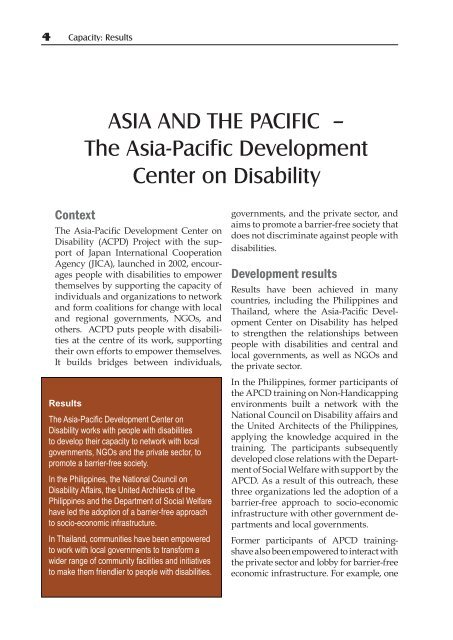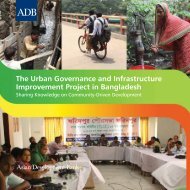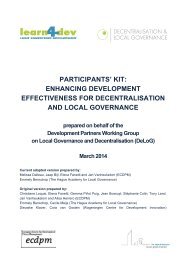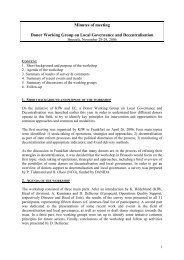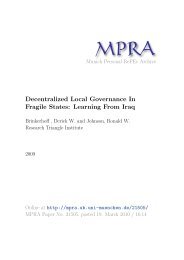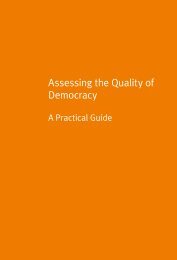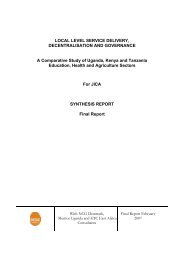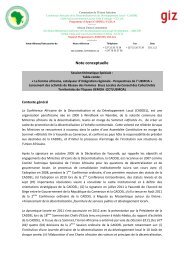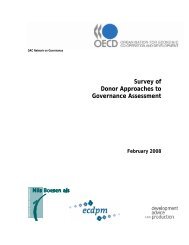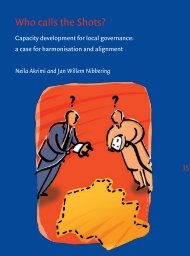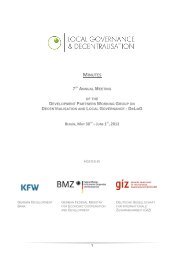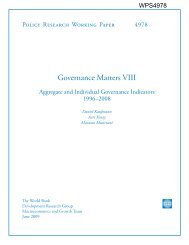Case stories on capacity development and sustainable results
Case stories on capacity development and sustainable results
Case stories on capacity development and sustainable results
You also want an ePaper? Increase the reach of your titles
YUMPU automatically turns print PDFs into web optimized ePapers that Google loves.
4 Capacity: ResultsASIA AND THE PACIFIC –The Asia-Pacific DevelopmentCenter <strong>on</strong> DisabilityC<strong>on</strong>textThe Asia-Pacific Development Center <strong>on</strong>Disability (ACPD) Project with the supportof Japan Internati<strong>on</strong>al Cooperati<strong>on</strong>Agency (JICA), launched in 2002, encouragespeople with disabilities to empowerthemselves by supporting the <strong>capacity</strong> ofindividuals <strong>and</strong> organizati<strong>on</strong>s to network<strong>and</strong> form coaliti<strong>on</strong>s for change with local<strong>and</strong> regi<strong>on</strong>al governments, NGOs, <strong>and</strong>others. ACPD puts people with disabilitiesat the centre of its work, supportingtheir own efforts to empower themselves.It builds bridges between individuals,ResultsThe Asia-Pacific Development Center <strong>on</strong>Disability works with people with disabilitiesto develop their <strong>capacity</strong> to network with localgovernments, NGOs <strong>and</strong> the private sector, topromote a barrier-free society.In the Philippines, the Nati<strong>on</strong>al Council <strong>on</strong>Disability Affairs, the United Architects of thePhilippines <strong>and</strong> the Department of Social Welfarehave led the adopti<strong>on</strong> of a barrier-free approachto socio-ec<strong>on</strong>omic infrastructure.In Thail<strong>and</strong>, communities have been empoweredto work with local governments to transform awider range of community facilities <strong>and</strong> initiativesto make them friendlier to people with disabilities.governments, <strong>and</strong> the private sector, <strong>and</strong>aims to promote a barrier-free society thatdoes not discriminate against people withdisabilities.Development <strong>results</strong>Results have been achieved in manycountries, including the Philippines <strong>and</strong>Thail<strong>and</strong>, where the Asia-Pacific DevelopmentCenter <strong>on</strong> Disability has helpedto strengthen the relati<strong>on</strong>ships betweenpeople with disabilities <strong>and</strong> central <strong>and</strong>local governments, as well as NGOs <strong>and</strong>the private sector.In the Philippines, former participants ofthe APCD training <strong>on</strong> N<strong>on</strong>-H<strong>and</strong>icappingenvir<strong>on</strong>ments built a network with theNati<strong>on</strong>al Council <strong>on</strong> Disability affairs <strong>and</strong>the United Architects of the Philippines,applying the knowledge acquired in thetraining. The participants subsequentlydeveloped close relati<strong>on</strong>s with the Departmentof Social Welfare with support by theAPCD. As a result of this outreach, thesethree organizati<strong>on</strong>s led the adopti<strong>on</strong> of abarrier-free approach to socio-ec<strong>on</strong>omicinfrastructure with other government departments<strong>and</strong> local governments.Former participants of APCD trainingshavealso been empowered to interact withthe private sector <strong>and</strong> lobby for barrier-freeec<strong>on</strong>omic infrastructure. For example, <strong>on</strong>e


